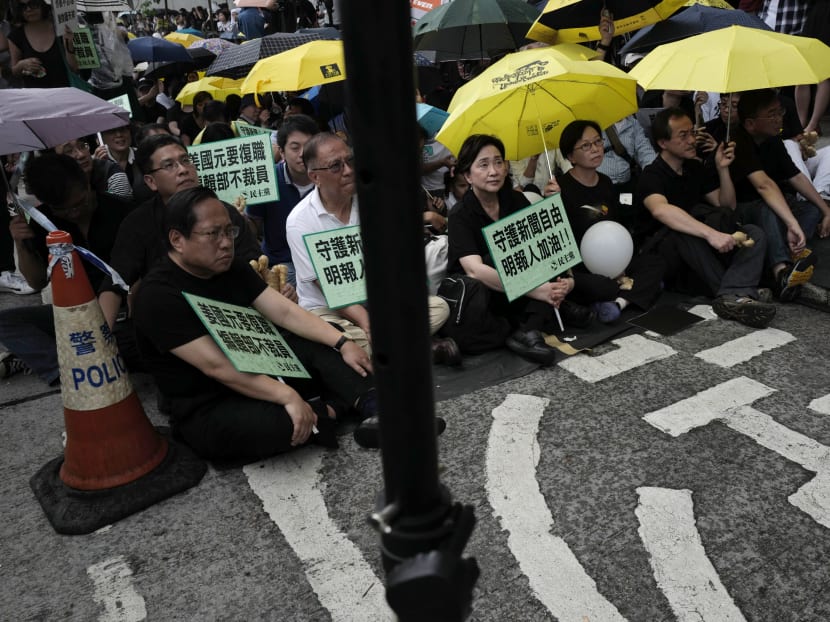HK in security clampdown for high-level Chinese visit
HONG KONG — Paving stones in central Hong Kong have been glued down to prevent protesters using them as missiles, as authorities roll out elaborate security measures ahead of a high-level Chinese visit that could stoke resentment over mainland rule.

Protesters gather outside the Ming Pao's office building during a rally in Hong Kong on May 2, 2016. Photo: AP
HONG KONG — Paving stones in central Hong Kong have been glued down to prevent protesters using them as missiles, as authorities roll out elaborate security measures ahead of a high-level Chinese visit that could stoke resentment over mainland rule.
The measures, which include barricades in central Hong Kong, come as Beijing tightens its grip on the semi-autonomous city where a fledgling independence movement in recent months has angered China.
Running battles with police in February, which included “localist” protesters in favour of more autonomy for Hong Kong, saw demonstrators dig up bricks from the street and throw them at officers.
Glue has been poured into the cracks between paving stones around the harbourfront convention centre where Mr Zhang, who chairs China’s communist-controlled legislature, will speak at an economic conference on Wednesday (May 18) on Beijing’s plan to revive the ancient Silk Road trade route.
Explaining the decision to glue the pavement, Hong Kong’s highways department said they might be “subject to vandalism”.
A 56-year-old Hong Kong man surnamed Guo who was linked to the city’s pro-democracy opposition was also arrested in the adjacent mainland city of Shenzhen on Sunday over a suspected plot to use a drone to disrupt Mr Zhang’s visit, according to Chinese state media.
Mr Zhang is the most senior official to visit Hong Kong in four years in a trip seen as an attempt to ease tensions and gauge the political temperature - he will meet with a group of pro-democracy legislators during his visit.
Hong Kong police were said to be deploying as many as 6,000 officers during Mr Zhang’s visit, twice the number of officers deployed during former President Hu Jintao’s trip in 2012.
“It’s both an anti-terrorism and security operation.” Mr Cheng Yiu-mo, assistant commissioner of police for operations, said.
But some activists have voiced fury over the ensuing security clampdown, with water-filled plastic barricades and metal fencing cordoning off central roads and flyovers.
“Keeping protesters away is ... ridiculous. It makes you feel like you are in North Korea,” said Mr Sham Tsz-kit of Civil Human Rights Front, which organises Hong Kong’s major annual July 1 political rally where residents air their grievances against the government.
“Zhang Dejiang is coming here to understand the situation in Hong Kong but now his eyesight will be completely blocked.”
The group says activists will “proactively get close to the convention centre” despite a no-protest security zone set up by police.
Police have termed the security moves “counter-terrorism measures”. “The security threat is higher than the past,” said a police source. “Activists have become more violent.”
Frustrations have grown among young activists since largely peaceful mass pro-democracy rallies in 2014 failed to bring political reform. Some now say they will not stop at violence to force change.
But China reiterated on Monday that Hong Kong “will never leave the motherland again”.
“A minority of people who are calling for Hong Kong independence will never win the popularity or trust of the public,” foreign ministry spokesman Hong Lei told reporters at a regular briefing.
Mr Zhang’s visit is also expected to help Beijing assess whether unpopular city leader Leung Chun-ying is a viable candidate for a second term - his current term ends in March.
Hong Kong is semi-autonomous after being handed back by Britain to China in 1997 and enjoys freedoms unseen on the mainland.
But there are growing fears those freedoms are being eroded by Beijing.
The disappearance last year of five Hong Kong booksellers known for publishing salacious titles on Chinese political leaders tapped those deep-seated concerns.
All five men resurfaced on the mainland, where four are facing criminal investigation. AGENCIES





